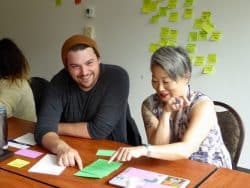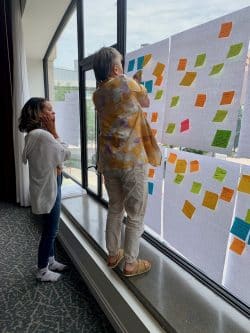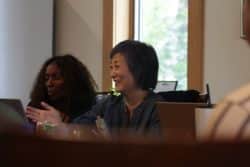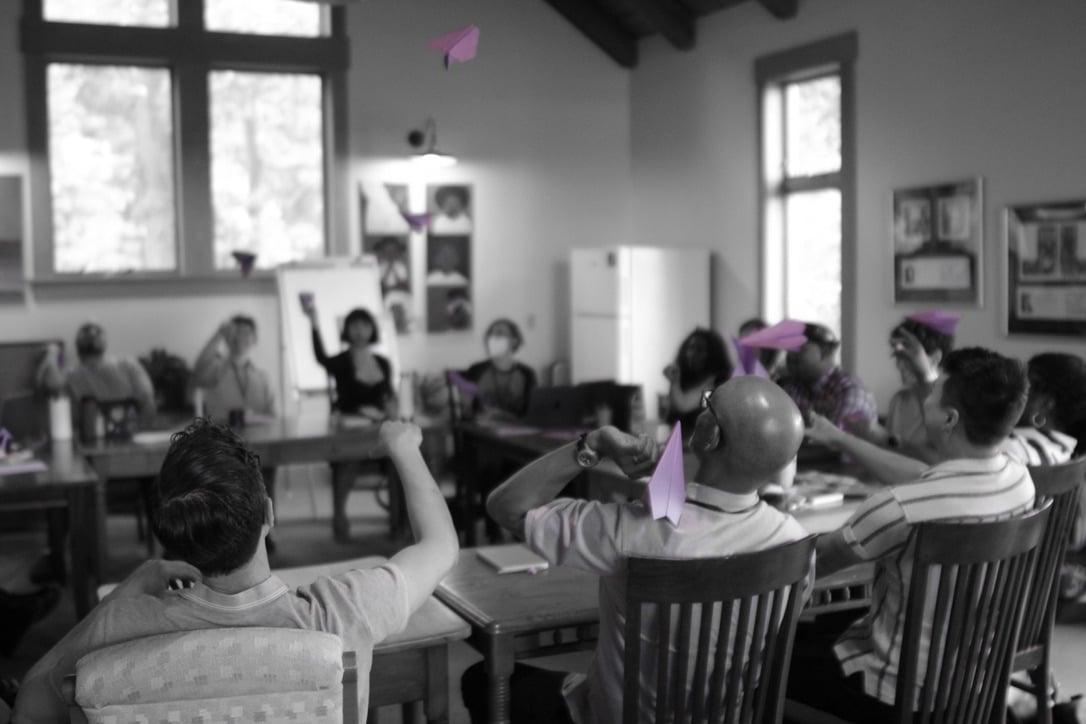15th Anniversary Spotlight: An Exclusive Interview with Prof. Lisa Nakamura
The heart of Book Sprints has always been innovation. Throughout our 15 years, we’ve had the privilege of working with leaders and trailblazers innovating in their own fields. We recently sat down with one such brilliant mind – Prof. Lisa Nakamura, a three-time Book Sprints organizer. We chatted a bit about her journey with Book Sprints and how she learned something new with each Book Sprint she’s done. She shared with us some key insights from her rich experience and highlighted the ways in which Book Sprints could transform traditional academic writing.
Prof. Lisa Nakamura is an accomplished professional in her field of research on digital media, race, and gender. She is the Gwendolyn Calvert Baker Collegiate Professor in the Department of American Cultures at the University of Michigan, Ann Arbor. She is also the founding Director of the Digital Studies Institute at the University of Michigan. She has written several books and articles on digital bodies, race, and gender in online environments, on toxicity in video game culture, and the many reasons that Internet research needs ethnic and gender studies, and featured as a speaker in a TED NYC Conference in 2019. With Book Sprints, she co-authored Technoprecarious, Digital Optimism, and Technoskepticism.
Book Sprint 1: Technoprecarious | Tackling the Big Problems Together
When Lisa first heard of Book Sprints, she was admittedly skeptical. She was the principal investigator for a three-year grant at the time, which in her perspective was an “awkward” amount of time to produce meaningful work (ie. a full-length book) in the humanities. “[The] currency in our field, for good reason, is the full length book.” Lisa shared. “Because most of the topics we talk about need elaboration. [The] scholarly contribution or academic contribution is always something which is analytical, […] more elaborated.”
When someone in her team suggested Book Sprints, it seemed like a well-bounded and compact way to ensure there was output – a full-length book – in the time period of their grant. “I was not sure if it was going to work, but it totally worked.” Lisa laughed. Her experience with the first Book Sprint knocked her expectations out of the park.

Prof. Lisa Nakamura (right) in her first ever Book Sprint with us.
With the right people at the right place with the right facilitation, their team of experts went from zero to book in five days. The entire process of getting it out and under contract took less than three months – a significantly lesser amount of time than they would have needed if they’d gone writing the traditional way together. It was published by MIT Press, as well as Goldsmith Press and Penguin Random House. “You know, the book we wrote, Technoprecarious, still earns money,” (three years after the publication in 2020), Lisa said to further add to the success of the sprint.
This first sprint illustrated one of the major appeals of the Book Sprint, especially for those in academia: the process is an efficient and creative space for collaborative writing. It presents a prime opportunity for busy academics to come together and write about key issues in a timely manner.
“The future of the humanities is collaborative,” Lisa said, “because there’s just too much for anyone to do […] the kinds of problems that matter […] big problems like that aren’t going to be fixed by one person taking six years to write by themselves.”
In a Book Sprint, experts are able to contribute knowledge from their own fields of expertise to create a diverse, representative, cohesive argument to chip away at solving the problems that matter in the most time-efficient way possible.
Book Sprint 2: Digital Optimism | Connecting the Community
One of the benefits of Book Sprints is learning more about your own – and your colleagues – thought processes and writing styles.

Prof. Lisa Nakamura (right) takes a closer look at the post-its guiding the writing process of her second Book Sprint.
Lisa described the conflicts that inevitably arise during the creative process. “Just knowing that’s going to happen and just writing it out and realizing this is probably happening for other people.” However, these disputes are resolved through the sprint process’ collaboration and feedback elements. One chapter that she initially thought was a bad idea was refined through group feedback to become a chapter that everyone was happy with.
In a very practical way, Book Sprints allowed the co-authors to understand each other’s professional skills better. Lisa shared her experience writing a recommendation for one of the writer’s job searches: “[…] I could write way better ones since we wrote together. And she is such a good thinker, such a good problem solver for anybody’s writing. So I could write that she’s a kind of gifted analytical researcher, and I could not have said that before because I just read her finished stuff.”
Lisa also shared that the second sprint allowed them to learn more about themselves, their co-authors, and how they work. One author in their group, in particular, learned that he preferred to write alone with minimal editing from others. He worked with it in the sprint and realized that it wasn’t for him; in contrast, Lisa said she could “do this forever” and had no qualms with her writing being edited. Going into the third sprint armed with this knowledge allowed both Lisa and the Book Sprints facilitator to adapt the process and allow him to find his place in the discussion on his own terms. This is a very real example of how Book Sprints can expose and develop key group dynamics in collaborative work settings for future reference.
Book Sprint 3: Technoskepticism | Breaking Barriers in Authorship
Lisa also shared with us how helpful the Book Sprints process is for mentorship in academia.
In the third Book Sprint that she co-organized, graduate students (postdocs) were invited to join. The collaborative nature of our sprints enables participants to witness each others’ work firsthand. In this context, students were allowed to view their mentor’s raw, unedited work and vice versa. “I think doing it with your own grad students is different. They get to see how you work and you’re not in any way conflicting,” Lisa explained.

In her third Book Sprint, Prof. Lisa Nakamura (right) invited graduate students to join, inadvertently demystifying the writing process for them.
One of the most transformative aspects of Book Sprints, according to Lisa, is the demystification of book writing – especially for their students or juniors. “I really also thought book writing is terrifying because junior people have never done it, like they have not seen it. […] Kind of makes the process accessible because you see you just put in the time. ”
Witnessing experienced writers engage in the same writing challenges and revisions as their peers has the effect of leveling the playing field. Lisa elaborated, “Seeing senior people who had written several books, in some cases, just sit down and roll up their sleeves and do it and realize everybody’s doing the exact same quality of job, which I think was true with our group.”
The third Book Sprint, in particular, converted a lot of skeptics among the juniors. “You know, our postdocs were very suspicious.” Lisa shared. “And now they are the biggest converts. And for good reason, you know, they had a lot at stake and were super afraid of looking dumb in front of the people they respect. […] And it’s interesting, they want to do it again [for their individual books], but not with us.”
Future Opportunities for Book Sprints in Academia

Lisa herself learned something new with every Book Sprint she’s experienced. Her hope is that more academics can sprint a book to tackle their field’s big problems together, connect with each other in their shared community, and break down perceived barriers to career advancement.
She shared with us her dream of making Book Sprints a fully accessible process to those who need it, especially in academia. To realize this dream, the academic community is encouraged to reflect: How can universities and institutions leverage Book Sprints to provide more opportunities for junior academics to thrive? How can senior mentors use Book Sprints as a way to build their community, provide support for their juniors, and enhance their impact through collaborative writing?
Lisa Nakamura’s experiences serve as a testament to the transformative power of Book Sprints. Transformation happens on several levels: for the authors, as they learn from their own unique experience, much like Lisa did; for the community, as they deepen their connection with each other through this shared experience; and for the field of academic writing, as hopefully more academics break away from traditional methods and engage in collaborative creation.
The heart of Book Sprints has always been innovation. After a decade and a half, we’re proud to highlight this innovation in new fields such as academic writing, from our roots in open source technology. The adventure doesn’t end here – we look forward to innovating in more disciplines and industries for years to come. Ready to be a pioneer in your field? If you are interested in creating transformation with Book Sprints, reach out to us at contact@booksprints.net to get started.
